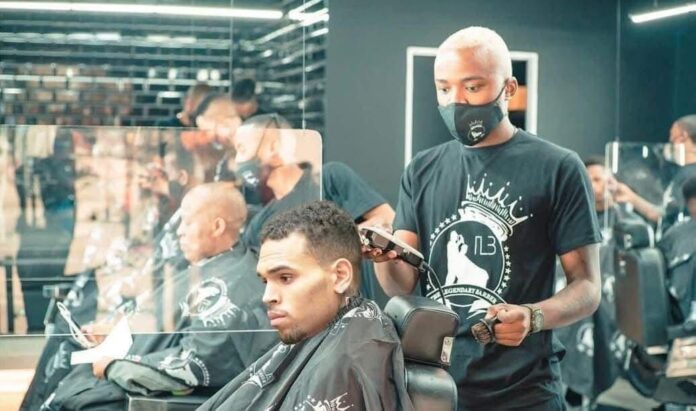Johannesburg – Tens of thousands of Chris Brown fans will pack Johannesburg’s FNB Stadium this Saturday and Sunday, witnessing the controversial American R&B artist perform hits like "With You," "Forever," and "Under the Influence."
The two-day concert, organised by Big Concerts, was added after the initial show sold out in under two hours, with tickets ranging from R745 for general admission to a staggering R5,774 for the presidential suite. This rapid sell-out, however, follows a wave of controversy surrounding Brown's presence in the country, raising questions about visa approvals and the entertainment industry's response to his history of violence against women.
The announcement of Brown's South African concerts ignited a firestorm on social media. Many South Africans voiced strong opposition, citing Brown's well-documented history of violence and its stark contrast to South Africa's ongoing struggle with gender-based violence (GBV) and femicide. The concerns, however, seemed to fall on deaf ears as the initial concert sold out remarkably quickly.
But I thought the Chris Brown tickets were sold out!?!?
🤔😅🤔 https://t.co/y7k9BAxbQI— Beau (@BeauBased) December 11, 2024
This initial success has been followed by a curious development: a surge in ticket resales. Internet users have observed a significant increase in tickets being offered for sale, leading to speculation that the initial sell-out was artificially inflated to create greater demand. This suspicion is fuelled by YFM radio station's announcement of discounted tickets at R200, significantly lower than the original R500 price.
🤣🤣🤣🤣🤣🤣🤣 they LIED. none of the dates are sold out 🤣🤣🤣🤣🤣🤣🤣🤣🤣🤣🤣🤣🤣🤣🤣🤣🤣🤣🤣🤣🤣🤣🤣🤣🤣🤣🤣🤣🤣🤣🤣🤣🤣🤣🤣🤣🤣🤣🤣🤣🤣🤣🤣
— RnB serial abuser's hater (@mbathambali493) December 10, 2024
The availability of these discounted tickets, after the concerts were declared sold out, further fuelled the accusations of manipulated ticket sales figures. Die-hard fans, however, have countered this narrative, explaining that the additional tickets were released for the second show, added to accommodate the high demand.
They are sold out cause you can’t purchase even on the open seats , try it
— G.u.g.u.lethuu 🏳️🌈 (@Gugu51991948) December 10, 2024
Brown's arrival in South Africa on Wednesday, accompanied by an entourage including bodyguards, was met with protests from organisations like Women For Change and political parties such as Good, who called for his ban from the country due to his history of abuse and a gender-based violence conviction in the US. Despite the calls for cancellation, Minister of Sport, Arts, and Culture Gayton McKenzie publicly supported the concerts, even offering tickets to those unable to afford them.
The "King of R&B," who rose to fame in 2005, has a long and troubling history of legal battles related to domestic abuse, sexual assault, and other violent crimes. The most high-profile case involved the 2009 assault of his then-girlfriend, singer Rihanna. He pleaded guilty, serving probation, performing community service, and undergoing domestic violence counselling. Further allegations include a restraining order obtained by former girlfriend Karrueche Tran and multiple accusations of sexual assault, which he denies. A documentary, "Chris Brown: A History of Violence," released in October, detailed these accusations, including explicit accounts of the assault on Rihanna and claims of rape. The film also highlighted other incidents of violence, such as smashing a window on the "Good Morning America" show, assaulting a man in Washington, damaging his mother's car, and assaulting Brazilian model Liziane Gutierrez. He has also faced lawsuits for assault and sexual assault, some of which were settled or resulted in dropped charges. Currently, a trial is pending concerning an assault charge brought by four concertgoers.
Women For Change, led by Sabrina Walter, launched a petition garnering over 51,000 signatures to prevent Brown's performance. Walter contacted the departments of home affairs, sport, arts and culture, and Big Concerts, urging them to cancel the concerts, but received no response. She questioned the granting of a visa to Brown given his conviction, imprisonment, and numerous reported violent incidents, which, under the Immigration Act, could deem him an undesirable person. The Act allows for waivers under certain conditions, but Walter believes these were not appropriately applied in Brown's case.
Immigration lawyer Ashraf Essop echoed these concerns, stating that home affairs should have denied Brown a visa due to his history of domestic violence. He emphasised that visa issuance is a privilege, not a right, and that the department should have considered Brown's suitability as a role model, especially during the 16 Days of Activism campaign against GBV. He also noted the requirement for a police clearance certificate, which should have been considered in the visa application process.
Despite repeated attempts, the Mail & Guardian received no response from the relevant departments or Big Concerts regarding these matters. The concerts, therefore, proceed amidst significant controversy, highlighting the complex interplay between entertainment, immigration law, and the fight against gender-based violence in South Africa.











